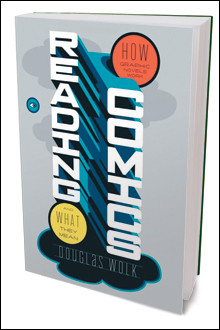Comic critic Douglas Wolk on Reading Comics
By JON MEYER | August 2, 2007
 |
Ever wondered what would happen if the famed Simpsons’ Comic Book Guy held a master’s in literary criticism? (“Worst. Extended metaphor. Ever.”). Then look no further than Rolling Stone, Pitchfork, and Phoenix contributor Douglas Wolk’s infectiously impassioned Reading Comics: How Graphic Novels Work and What They Mean (De Capo). Wolk is wise to keep his commentary accessible: rather than apply a sense of haughty legitimacy to comics, the author ably recognizes that comics are legit already, a bona fide medium with its own history, its own rules, and its own pratfalls. While he differentiates between “mainstream comics” and “art comics,” there is, above all, nothing but respect for what the form has to offer, regardless of genre. Especially now, in the midst of what Wolk refers to as the medium’s real “Golden Age,” when cartoonists like Alison Bechdel, Craig Thompson, and the Hernandez Brothers are coming out with work that’s as artistically fresh as it is commercially viable. Wolk will be on hand to discuss Reading Comics (and maybe pick some fights) at the Brookline Booksmith on August 2, and we spoke with him from his home in Portland, Oregon.You talk a lot about a “Golden Age” of comics being something that’s currently in full swing. How would you describe this in terms of what’s being produced versus what’s actually selling?
I don’t know how much it really matters. I mean, there’s selling and there’s selling. You can have a critical success that isn’t successful commercially, but still influences a lot of stuff after it. I think one of the absolute best things to come along in year was Alison Bechdal‘s book Fun Home. That has sold really well and just came out in paperback and it was Time magazine’s book of the year last year. There are lots of really good things that are, you know, small press and not a huge audience, but there are some really good things that are big presses and that are gonna do big audiences. The quality and importance of what’s coming out is kind of hard to correlate with what’s selling. You can say the same thing about movies or art. Are the biggest movies the most important or interesting movies, necessarily?
But mainstream comics are historically such a serialized form, to ensure a longstanding, consistent readership. Why do you think it’s so rare for art comics to be published that way?
They take a really long time. One big advantage of the serial format is that if you’re getting something fresh and new every week or every month, that keeps people really excited and really interested and really curious to find out what happens next. But cartooning takes a really long time. A lot of the comics that have come out monthly historically have been done assembly-line style — one person writing, one person penciling, one person inking. And art comics are generally done by one person, and the only person that has really been able to pull off that kind of auteurist thing every month is Dave Sim with Cerebus. Most people just can’t keep up that pace.
 Related
Related:
Sifting the trash heap, Heat waves, Populous With Short Stories | Drawn in Basic, More 
- Sifting the trash heap
There’s an image in an old Warlock comic book by Jim Starlin that sums up a lot of the peculiar, shared pleasure of reading comics.
- Heat waves
“Summer joys are spoilt by use,” wrote John Keats, meaning the less you do between June and August, the better.
- Populous With Short Stories | Drawn in Basic
Fans of Ben Gibbard will savor the insistent charm of Short Stories’ voice: a nasal but deftly melodic boy croon with a flair for neatness and a soft spot for slightly overdone harmonizing.
- Indulge me
If Dave Eggers’s career is any indication, the best way to become a writer of importance is to convince everyone you’re a self-indulgent jerk and then pull the rug out from under them.
- The Mostly Unfabulous Social Life of Ethan Green
Eric Orner, creator of the underground comic strip on which this film is based, has said that he’s always envisioned the strip as an animated sit-com. Watch the trailer for The Mostly Unfabulous Social Life of Ethan Green (QuickTime)
- All a-Twitter
Seven microblogging books worth scrolling upward for
- Spilling family secrets
Shortly after the 1979 Islamic Revolution, Iranian author Azar Nafisi began making a list in her diary.
- Water Dogs
A sort-of mystery novel that may or may not involve a crime, Water Dogs is also the story of a family broken by the death of its patriarch, "Coach," whose three children (fail to) cope with his death in highly individualized and complicated ways.
- Matching up writers and agents
At the Eastland Park Hotel on February 2, a dozen literary agents and publishers from Maine, Boston, and New York heard pitches from 75 aspiring writers on topics ranging from post-traumatic stress disorder to the history of the steamship.
- Congress bans kids from libraries?
Is it possible that Congress has just inadvertently turned millions of children’s books into contraband?
- Brit wits
Nick Hornby’s new novel is about a boy. Not About a Boy . Irvine Welsh’s new short story collection is filthy. Not Filth .
- Less

 Topics
Topics:
Books
, Entertainment, Media, Movies, More  , Entertainment, Media, Movies, Books, Graphic Novels and Comics, Book Reviews, Jeff "Comic Book Guy" Albertson, Alison Bechdel, Craig Thompson, James Schamus, Less
, Entertainment, Media, Movies, Books, Graphic Novels and Comics, Book Reviews, Jeff "Comic Book Guy" Albertson, Alison Bechdel, Craig Thompson, James Schamus, Less 